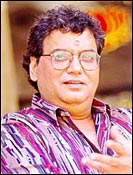Home > Movies > Features
'The Hindi film industry is not united'
Arti R in Mumbai |
January 30, 2003 14:48 IST
Subhash Ghai called a press conference last week to highlight ways to combat movie piracy and simultaneously announce his deal with Shemaroo for VCD and DVD rights to 10 of his films.
The films include Karz, Karma, Hero, Saudagar, Trimurti, Pardes, Taal, Yaadein, Rahul and Badhaai Ho Badhaai. The VCDs will be priced at Rs 149 and Rs 199; the DVDs at Rs 550.
"It was important to take this step towards curbing piracy, which is a growing menace affecting our industry," Ghai said.
He declined to comment on the monetary value of the deal with Shemaroo, but stressed the VCDs and DVDs will be available only across the country.
Among the industry insiders Ghai invited to speak on the occasion was Film Information editor Komal Nahata. "In the fight between producers and directors," Nahata said, "outsiders -- cable operators -- make money. We need to adapt to technology and follow Hollywood, which earns $255 million by DVD sales. DVD rentals alone account for $385 million. We have to realise DVDs and VCDs are here to stay. We have to realise movies, DVDs, VCDs need to exist. Today, most of the money and business from theatrical releases is gained in the first four weeks of a film's release."
Nahata emphasised there should be a lock-in period for a year on DVD and VCD releases.
Distributor and exhibitor Manmohan Shetty offered the concept of a digi distributor, saying, "You should make DVDs the same day and make money. If you cannot fight technology, one must join them. That is the only way [to survive] in this business, especially with the numbers of video parlours increasing. Today, the audience wants to see a film first day, first show. If the producer cannot show it, the video parlour comes in and makes money, especially in B and C centres."
Distributor Shyam Shroff felt, "India is the only country where you can see films openly on cable television. We are helpless. In the last five years, I have spoken with chief ministers, deputy commissioners of police and local authorities. These functions cannot help unless we don't do something. The Hindi film industry is really not united. Unless that happens, we are of no use at all."
Actor Akshaye Khanna had interesting points to make: "In the South [India] , there is absolutely no piracy. Fan clubs are very powerful and inform authorities the minute they see pirated films of their stars being shown on cable television. In Chennai, cable operators are fined heavily when they are caught. In the rest of the country, a powerful cable guy can go scot free. We have not understood the impact and potential of films on people. We need to treat that with respect."
Directors Abbas-Mustan rued the current level of piracy, "We have seen our films sold like vegetables. Today, ticket prices have become so high that a family cannot afford to watch a movie."
Kunal Dasgupta, CEO, Sony Entertainment Television, underlined, "Seventy per cent of the money made in Hollywood is via [video and DVD] rentals. That is how Hollywood survived. That is the way for Bollywood too. The concept of windowing needs to be adapted so that there is pressure on the pirates to match rates."